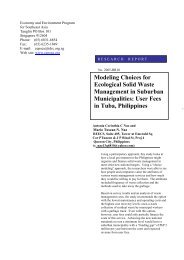systems research - the IDRC Digital Library - International ...
systems research - the IDRC Digital Library - International ...
systems research - the IDRC Digital Library - International ...
Create successful ePaper yourself
Turn your PDF publications into a flip-book with our unique Google optimized e-Paper software.
some simple statistical tests to ascertain whe<strong>the</strong>r <strong>the</strong>re are significant differences in<br />
<strong>the</strong> welfare determinants of <strong>the</strong> farmers belonging to <strong>the</strong> two groups (Hafi and<br />
Ranaweera 1990). The rationale behind this approach is that <strong>the</strong>re is an impact on<br />
productivity if <strong>the</strong> dummy variable is significant. The significant differences found<br />
among welfare indicators are <strong>the</strong>n attributed to this impact on productivity.<br />
However, when a production function between two farmer groups is<br />
estimated using pooled data with a dummy variable, <strong>the</strong> implicit :issumption is that<br />
<strong>the</strong>re is only one set of structural parameters common to <strong>the</strong> two groups. The only<br />
difference, if <strong>the</strong> technolop had an impact, would be in <strong>the</strong> intercepts. This<br />
represents only partial reality because a substantial difference between <strong>the</strong><br />
technologies used by <strong>the</strong> t ~'o groups of farmers nlould most probably result in two<br />
different production functions with different parameters for ano<strong>the</strong>r variable. This<br />
necessarily changes <strong>the</strong> factor proportions and results in changes in factor incomes<br />
(factor shares) and consequzntly in personrll incomes.<br />
In <strong>the</strong> earlier approach, <strong>the</strong> differences in welfare indicators between <strong>the</strong> two<br />
groups of farmers are unquestioningly attributed to adoption of <strong>the</strong> new technology.<br />
The actual factors that link a technological change to a change in f:lrm welfare (i.e.,<br />
income generation and distribution parameters) are left totally unexamined because<br />
of a paucity of data<br />
In this study, three facets of this in1p:lct were considered:<br />
o If <strong>the</strong> key practices or inputs of <strong>the</strong> new technology package are adopted<br />
widely, it can be stated that <strong>the</strong>re has been an impact on agronomic<br />
practices (i.e., <strong>the</strong>re has been a technical inipact);<br />
o Adoption of some agronomic practices, or a technical impact alone, does<br />
not guarantee an economic impact. Economic impact req~lires <strong>the</strong><br />
adoption of practices to such a degree that a structural change is induced<br />
in <strong>the</strong> production functions of <strong>the</strong> farm; and<br />
o A structural change leads to changes in functional and, <strong>the</strong>reby, personal<br />
income distributions, which, in turn, vary .<strong>the</strong> levels of welfare and give<br />
rise to a welfare impact.<br />
The levels of adoption of various components of <strong>the</strong> tecllnology must 172<br />
examined to determine <strong>the</strong>ir agronomic impact on farm practices. To ascertain <strong>the</strong><br />
economic impact, an analysis is required of structur:ll ch:lnges in production<br />
functions and of changes in factor payments.<br />
If any welfare impact of <strong>the</strong> new technology exists, a c11:lnge in <strong>the</strong> le\fels and<br />
distribution of personal income would rnost probably be cliscernihle. The factor<br />
incomes are, <strong>the</strong>refore, converted to personal incomes by taking into account <strong>the</strong><br />
ownership of <strong>the</strong> various factors by farmers and by o<strong>the</strong>r individuals or institutions.
















